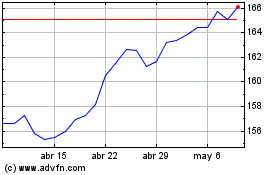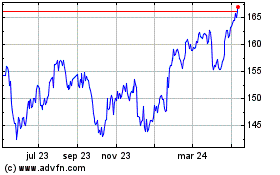By Paul Page
Sign up: With one click, get this newsletter delivered to your
inbox.
Some of the world's biggest consumer-goods suppliers are taking
aim at packaging. Companies including Procter & Gamble Co.,
Nestlé SA, PepsiCo Inc. and Unilever PLC say they'll start selling
some products in glass, steel and other containers designed to be
returned and refilled, reports the WSJ's Saabira Chaudhuri. It's a
plan to eliminate plastic waste that would reverberate across their
supply chains. The efforts could reduce waste from single-use
packaging, and the companies hope it lures eco-conscious consumers,
provides important data and fosters brand loyalty. The idea seems
to face long odds, though there is history here: Refillables once
dominated industries such as beer and soft drinks but lost out to
single-use containers. The new effort takes in products including
shampoo, laundry detergent and cereal. Some stores sell such goods
in bulk with reusable containers, but the practice is a niche
without large-scale distribution channels.
The corporate alarms over Brexit are growing louder. Aircraft
manufacturing giant Airbus SE sharpened its threat to move
operations out of the U.K. if politicians can't strike a deal for
an orderly departure from the European Union, the WSJ's Robert Wall
and Max Colchester report, raising the prospect of a big shift in
high-value aerospace supply chains. Airbus Chief Executive Tom
Enders calls the lack of clarity for businesses as the March 29
deadline nears a "disgrace," and some corporate managers are
starting to take their own actions. P&O, the once-iconic
British shipping giant now owned by Dubai's DP World, says it would
re-flag its English Channel ferries in Cyprus. A shift in the
aerospace industry would sting more. The sector is among the
country's biggest exporters, but even British aircraft engine maker
Rolls-Royce Holdings PLC says it could shift some operations to
Germany depending on the Brexit terms.
Global energy markets may have to brace for another shift in oil
supply chains. The economic slowdown taking hold in China will
likely curb the country's appetite for gasoline this year, the
WSJ's Kevin Kingsbury writes, leading to a likely flood of exports
to the rest of Asia. That could pressure margins for the region's
refiners but may boost some tanker operators who have been looking
for more stability in volatile international crude markets. Chinese
demand has been a key support for oil prices, and import volumes
rose at double-digit rates in 2017 and 2018, as car ownership and
industrial use both grew. Car sales fell last year for the first
time in nearly 30 years, however, and could decline again this
year. Official fuel-export quotas, which include diesel and
kerosene, jumped 35% last year, and China may raise them again so
refiners can maintain production.
SUPPLY CHAIN STRATEGIES
Walmart Inc. is sending a new warning signal to the U.S.
trucking industry . The retailer plans to add around 900 drivers to
its sprawling U.S. private-fleet operations after hiring about
1,400 truckers last year. The hiring effort comes in a trucking
sector that added nearly 37,000 jobs last year as freight demand
heated up and carriers raised pay and incentives for drivers. The
Dallas Morning News reports Walmart's new hiring effort includes
higher compensation that will take average annual pay to $87,500.
The bigger impact on the market may come in a streamlined
"on-boarding" process aimed at getting new hires on the road
faster. It's a sign Walmart sees greater private-fleet operations
as a long-term solution to the capacity and service concerns of
2018. With dedicated fleet operations growing rapidly at some
trucking companies, Walmart doesn't appear to be alone in that
decision.
QUOTABLE
IN OTHER NEWS
An index of U.S. business trends slipped 0.1% in December.
(WSJ)
The number of Americans filing new applications for unemployment
benefits fell to the lowest level since 1969. (WSJ)
Mexico's gasoline prices are declining despite a fuel shortage.
(WSJ)
Some U.S. airlines warned of growing delays and more canceled
flights if the partial federal government shutdown drags on
further. (WSJ)
American Airlines Group Inc. swung to a fourth-quarter profit
and cargo revenue rose 3% as higher pricing offset a traffic
decline. (WSJ)
Southwest Airlines' fourth-quarter cargo revenue was flat at $45
million while passenger revenue rose sharply. (WSJ)
Huawei Technologies Co. unveiled a chipset for 5G devices even
as it faces a growing backlash from Western governments. (WSJ)
China's state-owned Silk Road Fund denied it has been in talks
with smartphone parts supplier Japan Display Inc. over a potential
investment. (WSJ)
Moody's says Sears Holdings Corp.'s plan to shutter more stores
will hurt struggling lower-tier regional malls most. (WSJ)
Starbucks Corp. boosted sales at U.S. cafes 4% in the past
quarter. (WSJ)
Bristol-Myers Squibb Co. swung to a fourth-quarter profit as it
worked toward the planned acquisition of rival Celgene Corp.
(WSJ)
U.S. Commerce Secretary Wilbur Ross says Washington and Beijing
are "miles and miles" from resolving their trade dispute. (South
China Morning Post)
Amazon.com Inc. is testing a wheeled robotic delivery vehicle it
calls Scout. (Seattle Times)
Japanese auto makers face roughly $1.37 billion per year in new
tariffs under Brexit. (Nikkei Asian Review)
Union Pacific Corp.'s fourth-quarter net profit rose 29% and
international intermodal revenue soared 21% during the full year.
(Progressive Railroading)
Norfolk Southern Corp.'s fourth-quarter profit jumped 44% on
strong pricing. (Associated Press)
Transport equipment maker Wabash National Corp. sold its
aviation and truck business to Garsite Progress. (Inside Indiana
Business)
Chinese oil company Sinopec produced its first batch of
low-sulfur marine fuel. (Ship & Bunker)
Libya's two governing authorities will jointly support the
construction of a deep-sea port near the city of Susah. (Libya
Herald)
Cosco Shipping Ports is buying a controlling stake in Peru's
Chancay terminal and will work with Volcan Compañía Minera to
expand the site. (Seatrade Maritime)
Belgian tanker operator Euronav NV's fourth-quarter profit
tumbled despite a strong improvement in crude carrier rates.
(Shipping Watch)
The Dutch Spliethoff Group bought five cargo vessels from
bankrupt operator Hansa Heavy Lift. (TradeWinds)
Freight forwarder Kuehne + Nagel International AG won't
challenge rival DSV A/S's bid to take over Panalpina. (Lloyd's
List)
Several cargo airlines are adding to their freighter fleets this
year. (The Loadstar)
Discount retailer Ollie's Bargain Outlet Inc. is planning a
large distribution center south of Dallas. (Dallas Morning
News)
Ryder System, Inc. is expanding its COOP truck-sharing platform
into South Florida. (DC Velocity)
Digital supply chain startup Citizen Reserve will work with RFID
tag manufacturer Smartrac. (TechCrunch)
ABOUT US
Paul Page is editor of WSJ Logistics Report. Follow him at
@PaulPage, and follow the entire WSJ Logistics Report team:
@CostasParis, @jensmithWSJ and @EEPhillips_WSJ. Follow the WSJ
Logistics Report on Twitter at @WSJLogistics.
Write to Paul Page at paul.page@wsj.com
(END) Dow Jones Newswires
January 25, 2019 09:27 ET (14:27 GMT)
Copyright (c) 2019 Dow Jones & Company, Inc.
Procter and Gamble (NYSE:PG)
Gráfica de Acción Histórica
De Mar 2024 a Abr 2024

Procter and Gamble (NYSE:PG)
Gráfica de Acción Histórica
De Abr 2023 a Abr 2024
